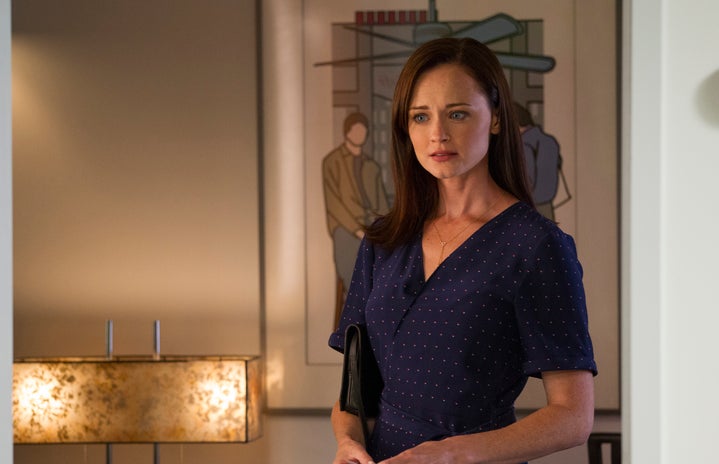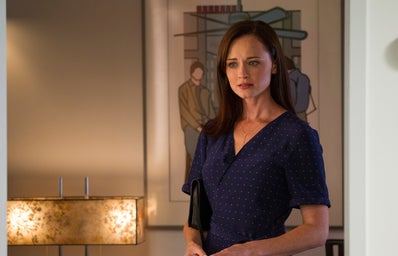Years after the show first aired, “Gilmore Girls” has steadily grown in popularity, but there is one characteristic that has not flourished with the show’s continuous success.
Rory Gilmore—one of the two main characters—is a comfort character to many, but since a Netflix revival of the show entitled “Gilmore Girls: A Year in the Life” was released in 2016, many fans have began to turn away from Rory, pointing out many real flaws in her and identifying her as the true villain of the show.
It’s important to first acknowledge that when talking about the defense of Lorelai “Rory” Leigh Gilmore, I am not justifying all of her choices. The whole Dean situation is not my concern because objectively that was a mistake. Instead, I am flashing forward to season five, which many fans recall as the infamous animosity between Rory and her charming mother, Lorelai.
Rory gets her first foot in the door of journalism by interning at a small publication owned by the father of her affluent boyfriend, Logan Huntzberger. After working there for some time, Mr. Huntzberger blatantly informs Rory that she does not have what it takes to be a journalist, the career she has spent her entire life dreaming of. Crushed by this haunting reality, Rory immaturely acts out and steals a boat with the help of Logan. Lost in her own identity, she decides to take a break from her attendance at Yale University and stubbornly moves in with her wealthy grandparents while she completes community service and figures her life out.
From a first glance, Rory’s actions can be summarized as selfish and immature, but by examining the larger root of the issue, it really is no surprise that Rory acts as she does.
“Gilmore Girls” tells the story of a mother and daughter in their charming small Connecticut town. Lorelai (Lauren Graham) is reckless and charismatic, having gotten pregnant at 16 years old, and Rory (Alexis Bledel) is the opposite. She is immeasurably driven, as the first season shows with her experiences at an intense college preparatory high school. From the beginning, her sole goal and academic motivator is to attend Harvard University and, as she puts it, “be Christiane Amanapour.”
And for the most part, Rory does exactly that! Although she gets accepted to Harvard, she ultimately attends Yale University after being her high school graduating class’s valedictorian. It seems that she has achieved all the successes she aimed for, and she is fulfilling the life that her mother never had. Always held in the highest esteem, everything is looking up for Rory.
Rory Gilmore is an excellent candidate for “gifted kid burnout,” which refers to the people praised as children for their intellect and skills but struggle to maintain this perfect, impeccable image as they get older and the burdens of life press upon them. If you need a fuller picture of this, Rory Gilmore is the poster child for “Nothing New” by Taylor Swift and Phoebe Bridgers. These are the kids who are told from a young age they can do anything, and when they inevitably can’t, they blame themselves instead of the reality of how the world functions. As a result, these people often experience many emotional challenges, such as higher rates of depression, anxiety and perfectionism. While achieving high from a young age often does result in success in the future, the issue with treating people as “gifted” and/or “special” may leave them vulnerable to crushing futures if they don’t experience the achievements they had hoped for themselves and been told they could receive.
Lorelai tells Rory there is nothing she cannot do if she puts her mind to it, and while this is true for the majority of Rory’s life, as she receives high school and college tuition from her grandparents and consistently achieves high academically, it is inevitable that she must crash at some point. When told by Mr. Huntzberger that she is not as good of a journalist as she once perceived herself to be, she is not only bewildered, but she feels the foundation of her life crumble beneath her. This rejection is deeper than usual because it is not just a critique, it is a denial of everything Rory has worked for up until that point.
Her perfect goody-two shoes image is shattered, and Rory loses the academic motivation that used to propel her forward in life. She attempts to find clarity in her life by involving herself with the Daughters of the American Revolution organization as she decides if academia is for her. Although this is a highly expensive and privileged choice that Rory is able to make, her grandparents willingly accept her into their house, and this safe landing of wealthy living nonetheless becomes her coping mechanism. Momentarily shot down by criticism of the one thing she has been praised for during her entire life, Rory tries on different versions of herself, as I am sure we all have done at one point or another when we feel lost.
Another common critique of Rory’s actions is that they seem so un-Rory-like! Lovers of the show argue that Rory in the later seasons barely resembles the sweet-hearted schoolgirl with flawless academic motivation of the first three seasons, but this is a weak argument. Personally, I barely recognize the person I was in high school, and many of my friends would agree. Who’s to say you can’t change as you get older, and if you are being honest with yourself, I find it highly unlikely if you were to say you are the exact same as you were in high school. No one is perfect, and Rory is certainly not an exception. She is a college student, after all, and it is commonly believed that the majority of people’s mistakes occur in their youth. Although Rory slips up majorly, she finds her footing once more and goes on to become the Editor in Chief of the Yale Daily News.
Unsurprisingly, Rory’s imperfection is what “Gilmore Girls” creator, Amy Sherman-Palladino, intended it to be. Her original plan for the original show’s conclusion was for Rory to unintentionally get pregnant after finishing college, mirroring the experience of her mother closely. However, as Sherman-Palladino ultimately did not work on the final season of the show, this plotline was put aside until the revival. However, with this original ending in mind, Sherman-Palladino made sure to put the bulk of Rory’s mistakes in life in her college years, as she learns to navigate the world outside of the bubble of Stars Hollow which defined her upbringing. She was meant to fail, and this contrasts the academic glow she had in the earlier seasons.
As an avid fan of the show, the villainizing of Rory Gilmore demonstrates a common desire in television watchers to see perfection in their favorite shows, but I find Rory Gilmore relatable because she fails. While all of her actions certainly are not justifiable, to berate a young character and write her off as “immature” is to deny natural human flaws that we all possess. Some days, it feels like I am the only one who still has hope in the fictional character who shaped much of my personality today, and although she is far from perfect (and once again, what character or real person is?), she will always remain one of my favorite television characters.


